Dragon Inn (1967)
Directed by: King Hu
Written by: King Hu
Starring: Chun Shih, Feng Hsu, Lingfeng Shangguan, Ying Bai
Taiwan
AKA LONG MEN KEHHAN, DRAGON GATE INN
AVAILABLE ON DUAL FORMAT BLU-RAY AND DVD: NOW, from EUREKA ENTERTAINMENT
RUNNING TIME: 107 min
REVIEWED BY: Dr Lenera, Official HCF Critic
China, Ming Dynasty, the Eight day of the Jingtai Era, 1457. Minister of Defense Wu Chien has just been executed, thanks in part to lies spread by eunuch Tsao Shao-chin, who controls both the secretive Eastern Agency and Palace Guards. The Emperor has allowed Wu’s family to live in exile, but Tsao figures this will just lead to revenge, and when the first attempt to assassinate them fails, he dispatches the agencies’ top swordsmen, Pi Hsiao-tang and Mao Tsung-hsien, to Dragon Gate, where the Wus will cross into Mongolia. Unknown to them, the innkeeper, Wu Ning, was once one of the general’s lieutenants and has summoned help in the form of swordsman Hsiao Shao-tzu and brother and sister team Mr. Chu and Ms. Chu, to also come to the Inn, find the children and lead them to safety….
When Crouching Tiger, Hidden Dragon came out, I enjoyed it along with many others but couldn’t stop myself from constantly saying things to the effect of: “Yes, it’s good, but nothing new. They’ve been making films like this is Hong Kong and China for since the 1980’s”. Really, of course, it was since the 1960’s, though I’m less familiar with the very early examples of the wuxia film, wuxia being a subgenre of Asian cinema derived from a type of Chinese literature of the same name, the word being a compound composed of the elements wu [“martial”, “military”, or “armed”] and xia [“honourable”, “chivalrous”, or “hero”]. They tend to feature martial arts heroes in historical settings who write wrongs, and whose skills are highly exaggerated to superhuman levels of achievement and prowess – so I’m talking the “flying across the screen” kind, rather than the more realistic type. Dragon Inn was one of the first wuxia films to make a big impression, and, while its action may seem a bit primitive in comparison with what we got used to afterwards, it’s still a highly entertaining watch, rather like a Western, and nicely set in and around an inn, giving it the feeling of a play where the characters come on and off stage, only a play with bouts of bloody swordplay every now and again.
Dragon Inn was King Hu’s fifth film as writer and director. He’s not really a name many non-martial arts movie aficiados have probably heard of, but he was a major pioneer of the genre and his work has garnered considerable critical acclaim over the years. Hu began making films for the legendary Shaw Brothers, but after Come Drink With Me, despite its large success, he left the studio so he could have more freedom and moved to Taiwan, pretty much kicking off its whole film industry with Dragon Inn, which had a larger budget than Hu had been given to work with than before. Now this film was made before the days of wirework, but, when sharp editing wasn’t enough, Hu used trampolines so cast members could jump from one side of a shot to the other. Though hardly shown in the West – it would be a few years before the ‘kung fu’ boom, Dragon Inn was another major success for Hu. 1992 originally had two remakes planned, but only New Dragon Gate Inn went ahead as the producer for the other one died. 2011 saw a semi-sequel entitled The Flying Swords of Dragon Gate.
A narrator sets the scene, talking over shots of marching armies, and I must warn you right now that the wording of some of the subtitles is rather amusing, such as:”He has been framed by these dirty beasts”, though it was nothing to me who recalls the very badly translated subtitles you used to often get on videos of Asian action movies [“I will revenge you”, etc]. Anyway, we get some action almost immediately, with Wu’s family and their entourage attacked by a load of bad guys who spring up out out of the grass, and are rescued by Hsiao Shao-tzu in a flash of swordplay. While there are four main heroic characters in the story, and two minor ones, it’s Hsiao who is really the chief one, a somewhat mysterious, wondering fighter who really is akin to the archetypal Western hero, and he soon features in a masterfully handled sequence in the inn full of both mounting suspense and humour, almost Sergio Leone-like [something probably intended since two cues from the score of For A Few Dollars More play during some of it]. Hsiao is sitting at a table, while four bad guys sit at another table playing games and another sits on his own. The latter bad guy tries to repeatedly provoke Hsiao by demanding his food bowl and putting poison in his wine, while the poor waiter is caught in a middle. Hsiao is calm throughout, even when he gives the guy the meal he wants by sending it flying across the room to land the right way up on his table. Eventually all the villains lose patience and attack him, but Hsiao coolly bests them without needing to get up off his chair, though this bit is not as terrific as the bit where he catches an arrow in-between two chopsticks, puts it into a wine bottle, and hits it out so that it flies towards the window, and takes down the archer!
While the action in its first half is quite brief, Dragon Inn is still really good fun – it surprised me how much of a light touch it had while still maintaining a strong level of tension – as the various good guys and bad guys come and go at the inn and try to hide their plans from each other, even if they’re on the same side. Of course, it does eventually break out into all-out war, most of our chief good and bad characters getting the chance to face off against each other in showdowns usually involving swords, climaxing in a final battle where all four of our heroes battle the head bad guy Tsao Shao-chin, who really does seem unbeatable, though it doesn’t really have the level of excitement it should have. The duels, even if one remembers that this kind of movie was really just starting out at the time, were a little disappointing to me, and it’s obvious that the actual level of martial arts mastery from the cast isn’t very high at all. Nonetheless, Hu’s use of editing to suggest exaggurated abilities is very interesting. Instead of showing a warrior glide through the air, his ability to do such a thing tends to be more suggested, shown by a cut of him [or her] of them soaring into the air, followed by another cut of him already in a different position. This style culminates when one character cascades down a mountaintop side in a flurry of cuts. The editing style actually feels quite modern as well as being a bit jarring at times, but don’t worry, the action never becomes a headache-inducing blur where you can’t really see what’s going on!
In fact, it’s really quite surprising how well made this film actually is, though maybe I’m saying that because I’m more used to the Shaw Brothers-type martial arts films which often looked quite rough and often took place on the same sets and locations. Yes, there are some unintentionally funny moments, such as the over-the-top way people tend to die, or the bit when Shao-tzu is surrounded by loads of bad guys and we see him barely touching some of his opponents before the next cut shows them all falling to the ground, but Dragon Inn has a fine look to it, with some good outdoor cinematography from Hui-Ying Hua that even pulls off a memorable John Ford-style shot of the sun setting beside the inn, and often serves the narrative very well, most notably in the first shots inside the inn where, as the villains arrive and security check the place, the camera pans around ninety degrees at ground level and then cranes up from the ground level to the first floor. Also notable is the way the camera often tracks the opposite way to the direction people are moving in. Technically Hu and his crew were way ahead of any other of the early martial arts filmmakers such as Cheng Cheh, even shooting some of the fight scenes differently. The story very quickly becomes easy to follow while maintaining the right level of intrigue, while the characters are simply drawn but play off each other very well, from Hsiao’s quiet confidence to Mr. Chu’s noisy impatience to the nervous reluctance of one of the two bad guys who comes over to their side. Ms. Chu is a memorable female fighter, though even in this early film we have the oft-used idea of a woman not being recognised as a woman by many despite not being particularly disguised at all!
Acting is nothing special but superior to what you might expect. Aside from the afore-mentioned Ennio Morricone steals and a bit from Modest Mussorgsky’s Pictures At An Exhibition, I didn’t recognise any other uses of other film scores in Lan-Ping Chow and Ta Chiang Wu’s score, though it obviously does pilfer other material. The only other King Hu film I was familiar with prior to viewing Dragon Inn was the great A Touch Of Zen, one of the true masterpieces of the martial arts genre. Dragon Inn isn’t anywhere near the same level as that, but this pioneering martial arts movie is still pretty impressive and an essential purchase if you love this genre, and you can see the seeds of so many later films from Hero to Ashes Of Time [plus I have a distinct feeling, though to my knowledge he’s never mentioned it, that this film was a major source of inspiration for a certain Quentin Tarantino too].
Rating: 









I was very much impressed with how good Dragon Inn looked on Blu-ray. Eureka’s transfer, part of the “Taiwan Film Classics Digital Restoration and Value-Adding Project” commissioned by the Ministry of Culture to the Chinese Taipei Film Archive in 2013, is full of texture and contrast and far superior to how I ever imagined a home release of a 1960’s Taiwanese martial arts movie would ever look. While the package comes with 36 pages of linear notes, the main special feature on the Blu-ray is a slightly tongue in cheek 15-minute video essay looking at the film.

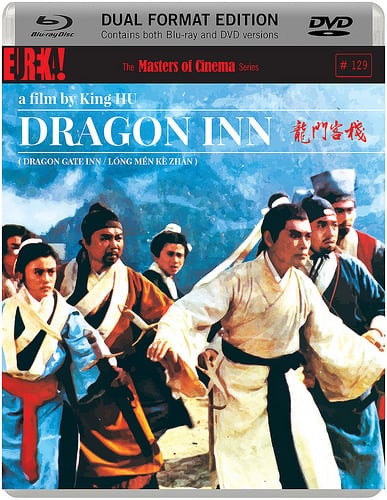
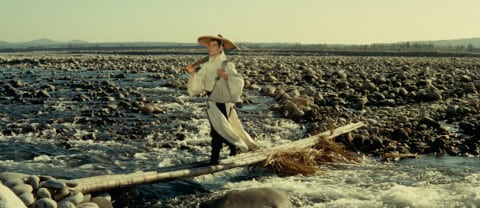
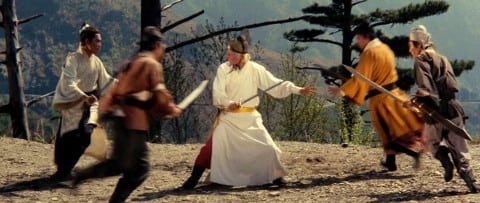

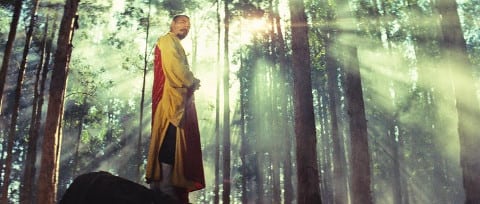
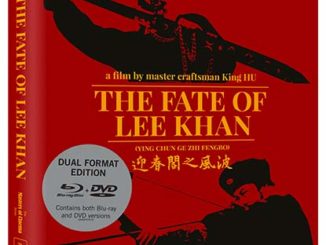
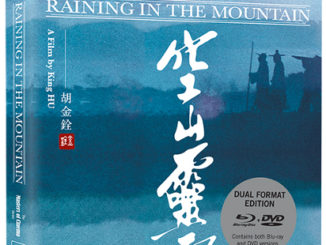
Be the first to comment